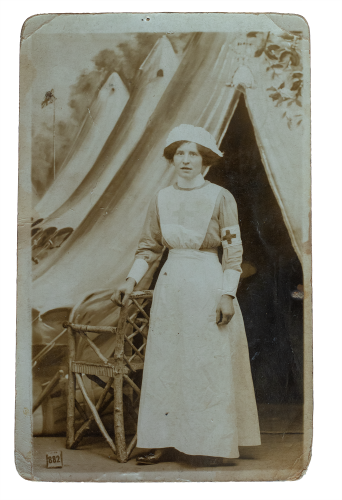Posted on: 17 June 2021
Earlier this year, CNWL celebrated Nurses’ Day for 2021, highlighting the crucial role of our nursing staff in response to the Covid-19 pandemic. We shared stories from across our wide nursing family, acknowledging their fantastic contributions, reflecting on their inspirations and careers.
Sally Lydamore, Service Manager with our School Nursing Service in Camden also had a special story to tell; the travels of her Great Grandmother, Lillian Leticia Liddell, who operated as a nurse in the First World War.
“Apparently, she called herself Lil or Letty depending on the situation,” says Sally. “She came from Scottish heritage and as a mother she ‘stood no nonsense’ with her fiery personality and bright red hair.”
Sally is uncertain why her Great Grandmother first came to London, it was perhaps to start nursing, but shortly after her arrival Letty met Sally’s Great Grandfather who was from Camden (by chance, the borough Sally now works in). In 1906, her Grandparents married in Kentish Town, having two children, Frances and David.
The pair were separated when WWI first broke out, with Sally’s Great Grandfather conscripted as a mechanic in the Royal Naval Air Service. When he was promoted to Sergeant, Letty followed him and nursed in the auxiliary hospitals for the wounded around Edinburgh, later being posted to service in France.
Details from this time are scarce, with the only remaining memory of Letty coming from a “photo” postcard detailing her journey to France as a nurse (see below). The home of Sally’s Great Grandparents was hit by an incendiary bomb at the beginning of World War II, and the postcard survived because of her Great Aunt Frances, who packed this in her belongings when she left home.
These postcards were popular mementos before and during the First World War, and an affordable way to send messages to family and friends. Sally’s postcard indicates Letty left her children Frances and David in the care of their Scottish grandparents during her service in France, and although her Red Cross uniform is clean the work itself would have been exhausting, unending and dirty; mirroring some of the conditions faced by nursing staff throughout the Covid-19 pandemic.

Letty returned to London after the war, and following the sad death of her son David from meningitis, Sally’s Grandmother Patricia (or Patsy) was born in 1921.
Sally remembers Patsy sharing her childhood memories of Letty, explaining she spent a lot of time going to work with her mother in community baby and children’s clinics supporting deprived, post-war families with their health needs. In addition, Letty ran a hardware store in Tottenham to boost the family finances.
“Fulfilling her nursing commitment and working in the shop meant that times were very hard bringing up her remaining girls. Her health must have suffered and she died very suddenly of a heart condition at the age of 48,” Sally says.
Coincidentally, the postcard from Letty was found around the same time Sally begun her nurse training.
“When things were hard and sometimes lonely, either in training or on the wards as a newly qualified nurse, I used to look at the postcard and think to myself it would have been so much harder for Letty in the First World War.”
“I imagine that nursing would have been basic care, with limited resources - having to improvise with what you could access and no technology. It was about resilience and survival. However, I believe the principles of nursing would have been the same as Florence Nightingale had intended - to treat all patients with dignity, compassion and respect.”
“Nursing has a pattern in both sides of my family, and my grandparents decided to give the postcard to me as a token of inspiration. They visited me regularly, taking me out for lunch and telling me the family stories. My Grandad was so proud to have four nurses in the family and it always encouraged me to achieve.”